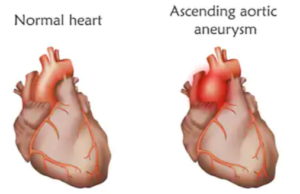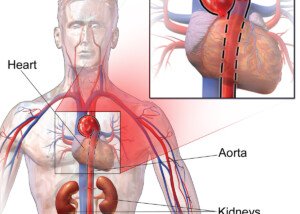A thoracic aortic aneurysm is a bulge in this great blood vessel that can kill a person within minutes if it rips open.
A genetic basis for a thoracic aortic aneurysm has been the subject of research.
Research (Nature Genetics, Milewics et al) revealed an association between a common genetic variant and a possible predisposition to an acute aortic dissection (AAD).
The genetic variant’s presence may double one’s risk of developing AAD.
The vast majority of people who suffer an acute aortic dissection have a pre-existing aortic aneurysm, which typically grows over time but usually produces no symptoms.
Genetic Variant Discovered Linked to Thoracic Aortic Aneurysm
The genetic variant is on chromosome 15, discovered by researchers (Milewicz et al), and the study report was published in 2014.
The gene involved is called FBN1. It has already been established that mutations in FBN1 cause Marfan’s syndrome, which predisposes patients to aortic aneurysms and hence, AAD.

Marfan’s syndrome. The thinness in Marfan’s is not caused by an eating disorder. Mileny ES Colovati1, Luciana RJ da Silva1, Sylvia S Takeno1, Tatiane I Mancini1, Ana R N Dutra1,Roberta S Guilherme1, Cláudia B de Mello2, Maria I Melaragno1and Ana B A Perez1/Wikimedia Commons
“Although patients with aortic dissection in our study did not have Marfan syndrome, this study suggests that the same pathways are involved in causing aortic dissections in patients with and without Marfan syndrome,” says the 2011 paper.
“Genetic cause for aortic aneurysm have been known but poorly understood,” says Michael Fiocco, MD, Chief of Open Heart Surgery at Union Memorial Hospital in Baltimore, Maryland, one of the nation’s top 50 heart hospitals.
“There appears to be familial aneurysm disease, but the gene that is causing it has been elusive.
“The one that is known is the aneurysms associated with Marfan’s syndrome.
“That gene has been identified on chromosome 15 and is related to the entire syndrome (tall, slender, hyperflexible joints, aortic aneurysm/dissection propensity).
“The abdominal and cerebral aneurysms remain a work in progress to find the genes.
“Various studies have shown that if a first-degree relative has an abdominal aortic aneurysm, you are 2-4x more likely to have one than someone without that family history.”
Marfan’s syndrome can go undiagnosed because its symptoms are often subtle and vary in severity.
Mild signs, such as joint hypermobility or eye problems, may be overlooked or mistaken for other conditions.
The most serious complications, like cardiovascular issues involving the aorta, can remain unnoticed until later stages.
Extra tall and thin kids or teens with long limbs or hypermobile joints should be evaluated for Marfan’s syndrome, as these traits are common in the disorder.











































